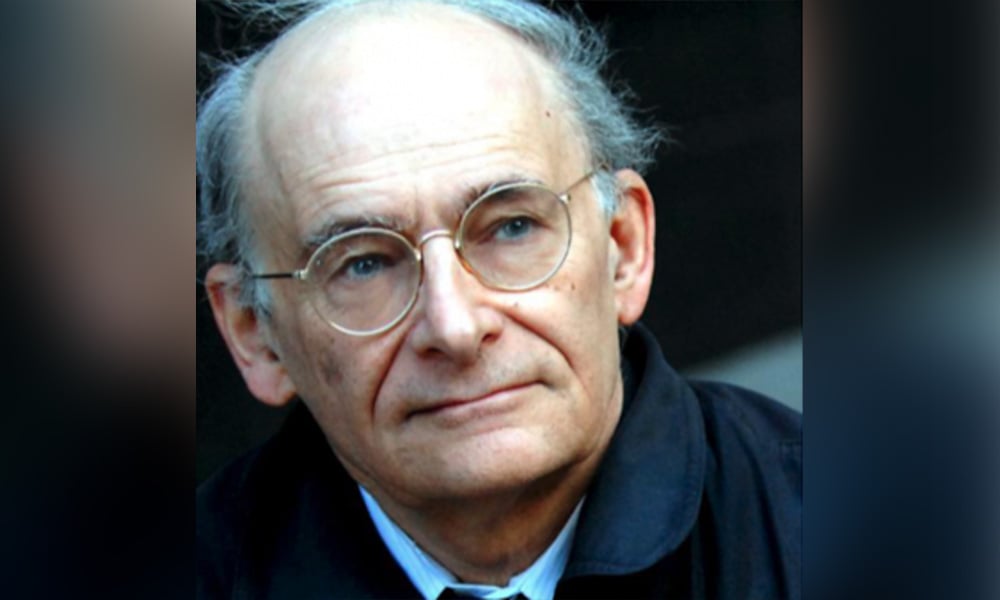Winnipeg-based Matas has long championed for refugees and those who face human rights abuses

For human rights, refugee, and immigration lawyer David Matas, advocating on behalf of dispossessed people around would seem a natural career path, given a family history that saw his ancestors escaping oppression in Imperial Russia to eventually find a new life in Canada.
Matas is among the many lawyers still working today who appeared in the very first edition of Lexpert's Canadian Legal Lexpert® Directory, which is now celebrating its first quarter-century with a 25th-anniversary edition.
In many ways, human rights, refugee, and immigration issues have not changed much since the 1990s when he first appeared in the directory, Matas says. But what is noticeable is the “huge increase in the global refugee population.”
He says there are an estimated 84 million refugees, compared to what would have been around 25 million back in the 1990s. The location of refugee “hotspots” has also changed. For example, parts of Europe are now homing many refugees who risked their lives crossing the Mediterranean.
The population of refugees has more than tripled, at a time when the global population grew by 40 per cent, “so I guess you could say that globally, things have got a lot of worse.” That is why countries such as Canada should continue, and even increase efforts, to provide a haven for refugees and improve lives, similar to how coming to Canada more than a century ago helped the Matas family.
The grandparents of Winnipeg-based Matas, Simon and Anna Matas, came from a part of Ukraine, near Odessa, that had suffered “massive spasms of anti-Semitic violence and pogroms,” as Matas describes in a family history he wrote for a family reunion a few years back.
This oppression included a pogrom in 1881, the year of Simon’s birth, and 1905, the year Simon and Anna, separately, left Russia. (Simon lost a sister in one of these pogroms when she was an infant. Anna lost a sister due to starvation, something that Jews in Russia found difficult to avoid given internal travel restrictions.)
After leaving Russia, the two met in England and eventually made their way to Winnipeg, following Simon Matas’ brother Matthew, who had arrived there in 1905. Anna and Simon married in 1909, built their own grocery store business by 1911, and went on to have six children.
Matas says in the family biography that “Simon and Anna were lucky to have got out of Russian and come to Canada when they did. If they had met, married and had children in Russia/Ukraine, their children would not have made it here [Canada].” He notes that after World War 1, Canadian immigration became “restrictive and anti Semitic.”
So, with such a family legacy, it’s easy to see why grandson Matas would be such a passionate advocate of campaigns to stop human rights abuses around the world. He has been involved in numerous national and international human rights groups and was named to the Order of Canada in 2008 for his contributions to human rights legislation and immigration and refugee law.
In 2010, Mr. Matas and former Edmonton MP David Kilgour were nominated for the Nobel Peace Prize for four years of investigative work into allegations that Falun Gong followers in China were being killed for their organs. They examined transplant programs of hundreds of hospitals in China, drawing on media reports, official propaganda, medical journals, hospital websites, and many deleted websites found in archives.
In addition to their publication of two reports, Kilgour and Matas co-authored Bloody Harvest: The killing of Falun Gong for their organs. The book details evidence that tens of thousands of Falun Gong practitioners had been killed by the Chinese regime in the process of extracting their organs for transplant surgeries.
More recently. In January, Matas was awarded the first-ever Global Humanitarian Leader of the Year award by the human rights group Canadians in Support of Refugees in Dire Need (CSRDN). The award recognizes outstanding individuals, organizations and programs that “uphold the principles of peace, justice and mercy, irrespective of race, colour or religion.”
Matas has also been a long-time senior legal counsel for B’nai Brith Canada. Recently, the organization has launched a new law society, named in his honour. It will operate as a subcommittee of B’nai Brith Canada’s League for Human Rights, with news to come of scheduled activities and ways that legal professionals can get involved.
At the age of 77, Matas continues his passionate lobbying and has repeatedly urged Canada to recognize as an act of genocide the plight of millions of Uyghurs and other Turkic Muslims detained in camps in China. These camps are described as the largest mass detention of a minority community since the Holocaust. Mr. Matas has repeatedly urged Canada to recognize the crisis as an act of genocide.
Matas points to one area of Canadian refugee policy where there have been significant changes in the private sponsorship program, whereby Canadians could assist in bringing refugees into Canada and be responsible for their integration. That program, which began in 1979, has seen increasing restrictions, where sponsorship numbers are capped. As well, the refugees have to fall within categories designated by the United Nations High Commissioner for Refugees, “which can sometimes be hard to get.”
“So I would call the sponsorship system a bit more constrained,” he says. “It used to be that almost anyone who wanted to sponsor a refugee could, provided the financial requirements were met. Now it is more difficult.”
On a more positive note, Matas points out the increasing digitization of documents and email have made it much easier to process refugee claims more quickly than regular mail or couriering of hard copies of documents.
However, even that isn’t foolproof, as it isn’t “as sophisticated as it could be,” in terms of ensuring documents are received, the requirement for a confirmation of receipt and the use of embedded links.










